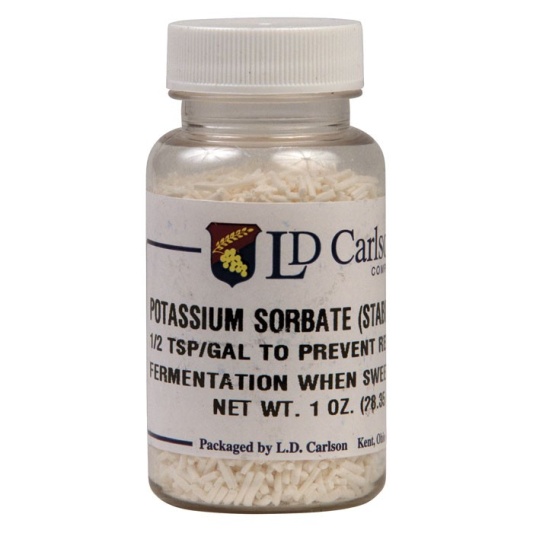Potassium sorbate can be found in a variety of sources, mainly as a preservative in preprocessed foods because it helps to prevent mold, fungi and yeast growth that can cause foods to spoil. This chemical can easily be produced and is quite inexpensive, making it an ideal choice for many industrial applications as well. While the material is generally considered safe for contact and consumption, it can be harmful if it is used excessively. Those who are allergic to potassium may also have difficulties consuming foods or using products that contain it.
What is Potassium Sorbate?
It's a chemical that is formed when potassium salt bonds with sorbic acid, creating a fatty acid salt that is polysaturated. At room temperature, it looks like a white crystalline powder, but the mixture will quickly dissolve in water, which will revert it back to sorbic acid as the potassium dissolves. Some forms of potassium sorbate appear as a yellowish powder which can be dissolved in propylene glycol, ethanol or water to create a preservative with a variety of pH levels.
Potassium sorbate is quite easy to manufacture. A combining potassium hydroxide and sorbic acid will cause a reaction that will create water and potassium hydroxide as the molecules bond. Then the water can be strained off to create a solid form of the chemical, or the potassium sorbate can remain dissolved in the water for liquid applications of the preservative.
Many consider potassium sorbate ideal for applications in foods because it is highly soluable and can be used at a wide range of pH levels, so it can be applied to a number of products without worry that it will break down. Most food monitoring organizations consider the substance to be non-GMO related and kosher so it does not affect the legal distribution of products. Potassium sorbate typically scores well in safety tests and it contains no additional odors or flavors that would disrupt the eating experience when it is added to commercial products.
Uses of Potassium Sorbate
- Potassium sorbate is found in many food products, especially those which are meant to be stored and eaten at room temperature. This helps to ward off particles such as mold or fungus that can cause foods to spoil or make people sick. Baked goods, processed fruits and vegetables or dairy products frequently contain this product.
- Winemakers will also use potassium sorbate as part of the fermentation process so that the wine can develop without yeast that would alter the flavor by devouring the sugar content of the berries. Many waxed wrappings or coatings on foods will also contain potassium sorbate as a way to increase preservative levels without altering the recipe of the food.
- Personal hygiene or beauty products will also use potassium sorbate in their solutions. Shampoo, lotion, cream-based concealers and other liquid products will often contain preservatives to prevent the products spoiling or breaking down as they sit on the shelf or in room temperature storage for long periods of time.
- Sealants, glosses and industrial coatings will often use potassium sorbate as well. This will help prevent the seal from breaking down over time and will help preserve the materials underneath. If the gloss is used on an organic material such as wood, it will prevent mold, fungus or yeast from attaching to the surface and causing damage.
Side Effects and Dangers of Potassium Sorbate
In most cases, potassium sorbate is considered non-toxic and safe for use in commercial and culinary applications. However, some scientists believe that the addition of synthetic ingredients to foods, especially foods which are consumed quite regularly, can cause long term side effects which can be harmful.
- Those who consume large amounts of food containing potassium sorbate may suffer from diarrhea which can cause them to deplete the nutrient value in their system. In lesser cases, the patient may suffer from nausea as your body becomes overwhelmed with the amount of potassium in your system.
- Those who frequently use cosmetic products that have potassium sorbate as a preservative can experience rashes or irritation if their body becomes overexposed to the drug. It can also cause irritation to the eyes if it comes in contact with them.
- Those who are allergic to potassium are even more likely to develop a negative reaction to potassium sorbate. These individuals will need to avoid products that have potassium sorbate listed as an ingredient to avoid a potentially serious reaction. In extreme cases this can lead to renal or kidney problems which can cause serious damage over time.
Individuals who are concerned about overexposure to potassium sorbate have a number of options they can use to avoid this product. Most foods have their preservative elements listed so people can opt to purchase a more natural version. Canned goods and preprocessed foods are much more likely to contain potassium sorbate, so those who do not want to consume this chemical can cut these processed products out of their diet and consume more natural or home cooked meals instead. Many fruits and vegetables are coated in a wax that contains potassium sorbate to protect them from contaminants at the store. Washing fruits and vegetables before consumption can remove this element, reducing your intake.
You will also need to check the ingredients listed on personal products to determine if your hygiene products or makeup have potassium sorbate included. If you cannot find this information on the packaging, most products will offer a questions and answers hotline where you can make the necessary inquiries.

